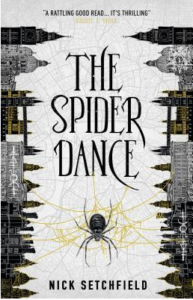Tabor Süden works for the Munich police in the missing persons bureau. One day, a man turns up in their offices and says he is back, they don’t need to look for him anymore. Problem is, no one had reported him missing. That would be odd, but relatively easy to dismiss except that over the next few days, he keeps coming back and says the same thing. Then, when he gets up from a conversation that he had been having in the main train station with Süden and a colleague, he socks a passing woman on the jaw and disappears into the city. What is going on?

That’s what Süden sets out to discover, although technically speaking he is on vacation that week. He interviews people acquainted with the man, Jeremias Holzapfel, and the story makes less and less sense at each turn. Someone else is living in the apartment where he is registered; is Holzapfel’s ex-wife involved in a tax dodge? Why did Holzapfel turn up at an old lover’s apartment and steal a whole new outfit? What is happening with Holzapfel’s current girlfriend? And where was he, during the four years that he says he was away? What has happened to someone who was once a trusted voice in local radio and a fixture on local stages?
This is the fifth of Ani’s novels to feature Süden, a series that now runs to around 20 volumes. (It’s the only one I have read, and I came to it through “München erlesen,” the Süddeutche Zeitung‘s series of 20 books in and about Munich.) In Süden und der Strassenbahntrinker (Süden and the Man Who Drinks on the Streetcar), Süden is forty-four, and slightly disreputable for a policeman. He’s not set on climbing the career ladder, he resists new technology — I presume the book is set at the time of publication, 2002, when mobile phones were common but smartphones not yet on the market — and he gets much closer to his witnesses than I would think is good policing practice. He’s an interesting first-person narrator to spend time with, aware of his faults but also not really trying to fix them. One of the things that pulls him into the Holzapfel case is that during one of their conversations, Süden tells the unmissing man something he hadn’t even told his closest colleagues on the force. What is it about this odd character that prompted such a reaction from Süden?
The case drives the brief (155 pages) novel, but it is also, after a fashion, irrelevant. Some of the most important actions revolve around other members of the missing persons bureau, and what is going on in their lives. Ani also takes care to show that just because a case is at the center of the book, it is not the only, or perhaps even the most important case in the office at that moment. Other colleagues are working on the disappearance of some young girls, and the head of the bureau does not understand why Süden is spending his time on Holzapfel, especially since he is supposed to be on annual leave anyway. He’s even less understanding of Süden volunteering his time for the homicide bureau when a corpse turns up.
Ani shows a Munich that’s rougher than the “lederhosen and laptop” image of Munich in the early 2000s, though definitely a city that I recognize from living there at that time. It has left behind the desperate years of Tauben im Gras or Schellingstraße 48, although one of the characters’ recollections of wartime and the immediate post-war years links the prosperous present to the hardscrabble past.
Süden und der Strassenbahntrinker is a solid police procedural, and if I read more of those I would probably read more of Ani’s work. As far as I can tell, only one of his works has been translated into English. That’s The Nameless Day, and it belongs to another series.










